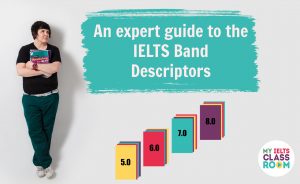How long should your IELTS writing task 1 & task 2 be? Learn how the examiner counts your words and the recommended length of your IELTS essay. This page contains information about:
- IELTS Writing Word Count Rules
- Recommended Essay Length
- Word Count Warning
- How Words are Counted in IELTS writing
IELTS Writing: Word Count Rules
- IELTS have set a task of writing OVER 150 words for IELTS writing task 1 and 250 for writing task 2.
- However, there is no upper word limit.
- While the under word count penalty has been removed, writing an essay that is too short will lower your score. Click here: penalty removal and short essays
Recommended Length of an IELTS Essay
- Always write over the word count as this is the best way to approach your IELTS writing.
- Aim for around 170 – 190 for writing task 1 and about 270 – 290 for writing task 2. This will mean you have developed your writing sufficiently for the higher scores in terms of words, but you must still ensure that each sentence is relevant and focused.
- Don’t write too much. Aim for quality rather than quantity. This means focus on writing excellent English and organising your information rather than writing a long essay in task 2. The also applies to your report in task 1 academic or your letter in task 1 GT.
Watch this video to learn more about how long your IELTS essay should be:
Will you get a higher score for a longer essay in IELTS?
The answer is very simple = no. IELTS is look for a highly relevant, focused essay. If you try to add information that is not 100% relevant to your task, you will get a lower score.
Don’t try to add a hook to your introduction to make it interesting. You don’t get more points for interest. You get more points for being focused and concise.
You do not get a higher score for a longer essay.
Warning for IELTS Writing Word Count
- If you copy the information given by IELTS for your introduction, the examiner will not count those words. This means you might be under the word count. So, always paraphrase your introductions. This lesson shows you how to write an introduction for IELTS writing task 2 by paraphrasing.
- How to check how many words you have written – you don’t have time to count each word you have written, so you should count the lines instead. Knowing the length of your handwriting on the official writing answer sheet will help. Watch this video lesson to learn about practicing with the official writing answer sheet.
More IELTS Writing Tips & Lessons
10 Sentences to Avoid in IELTS Writing Task 2
How many Paragraphs for an IELTS Essay
How to use the Official Answer Sheet for IELTS Writing
All IELTS Writing Task 2 Lessons, Model Answers, Tips & Free Videos
Main IELTS Pages
Develop your IELTS skills with tips, lessons, free videos and more.
- IELTS Listening
- IELTS Reading
- IELTS Writing Task 1
- IELTS Writing Task 2
- IELTS Speaking
- Vocabulary for IELTS
You must write more than 250 words for Task 2 and more than 150 words for Task 1.
Unfortunately, there is some really bad advice and misconceptions surrounding this question. The worst advice I’ve heard are ‘You don’t have to write 250 words in writing part 2, 10% below this is OK.’ and ‘You should write as much as possible to get a good mark.’ These two statements are wrong and will lead to lost marks.
What happens if I write under the word count?
The only advice you should listen to is this- If you want to answer the question properly, you must write at least 250 words in part 2 and at least 150 words in part 1. If you write less than these totals, you will lose marks under ‘Task Achievement’ because you haven’t answered the question properly.
IELTS examiners must sit and count all their words for this reason. It is really heartbreaking when a good candidate produces a great answer and only writes 249 words in part 2. Unfortunately, we have to mark them down.
Should I write more words to get a good mark?
No! This is a bad idea for a few reasons.
Firstly, you only have a set amount of time to answer both questions. Time management is one of the most important things to learn in the IELTS writing exam. If you spend too much time on one question, you sacrifice marks on the other.
Secondly, you are more likely to make grammar mistakes if you keep writing over the word limit, and this will bring your overall mark down.
Finally, you are being judged on quality, not quantity. Focus on making your answer the best it can be rather than the longest it can be. Remember you should allocate time to planning, checking, and writing.
How many words should I write?
You won’t have time to count all your words in the exam. Therefore, I suggest that you aim to write about 10% of what you are expected to write. In other words, aim to write around 160-170 words for task 1 and 270-280 words for task 2. If you aim for this amount, you are far more likely to exceed the required word limit.
How do I know how many words I have in the exam?
As stated before, you won’t have time to count all of your words, but there are other ways to judge this. I advise my students to download the official IELTS writing answer sheets, print them out and practice using these. All of the answer sheets are the same size; therefore, you will be able to see how much of the sheet you use for the required word limit.
Practising with the official answer sheets will also familiarise you with the test, and you will not get any surprises on test day.
Are all words counted the same way?
Unfortunately, no! Hyphenated words like ‘First-class’ or ‘State-of-the-art’ count as one word only. Contractions like ‘I’ll’ or ‘we’re’ also count as one word. (Ideally, you should not be using contractions in academic essays).
Words like ‘a’ ‘an’, and ‘the’ are always counted towards the word limit.
Punctuation is not included in the word count.
Can I copy words from the question?
You can copy single words but can’t copy whole parts of the question. You should never copy full sentences from the question. Repeating the question will mean the examiner subtracts these words from your word count and is therefore the same as writing nothing at all. You are being judged on your ability to paraphrase using synonyms, so try to master this skill, and you will avoid copying.
Example Question– Successful sports professionals can earn much more money than people in other important professions.
Example Paraphrasing- Successful athletes can make much more money than people working in other important jobs.
As you can see, I have repeated the words ‘successful’, ‘money’ and ‘important’, but I have replaced most of the other words with synonyms.
Can I repeat sentences?
Again, simply repeating yourself will lead to the examiner not counting these words. Some students try to repeat themselves if they are running out of time. It is always better to write something new than repeat the exact words again.
In the past, you automatically lost points from your Task Achievement / Response score if you wrote an under-length essay, report or letter. However, from mid-2018 the automatic IELTS word count penalty was removed. There has been no official announcement of this change and the information was supposed to be sensitive. However, as many people are now discussing this on various social media platforms, I thought it was time I addresses this issue to ensure students understand what this change means.
What does the new IELTS word count rule mean for students?
Well, honestly, not very much! Nothing on your exam papers will change. The prompts will still ask you to write 150 words for Task 1 and 250 words for Task 2. And ‘short’ pieces of writing will still be penalised, but just in other ways. How? Well…….
- If you write less than the recommended word count, your ideas probably won’t be extended enough to achieve a 7.0 for Task Response / Task Achievement.
- If you run out of time and don’t write a conclusion for your essay, you will also receive a low score for Task Response and/or Coherence and Cohesion, as you probably won’t have a clear position or finished paragraphs. Click here to read my blog post about what to do if you run out of time in the exam – it could save you at least 1 band score for TR!)
- Short answers might not also contain enough language to have ” a wide range of complex sentences”, which will affect your Grammatical Range and Accuracy Score.
- In the same way, it will be hard to achieve a very high score for Lexical Resource if you don’t provide the examiner with a wide enough sample of your writing. The examiner can only give you points for the words they see on your exam paper, so make sure you write enough to show them your best vocabulary!
However, the change in the IELTS word count rules WILL mean that you no longer have to waste time counting words!!! And, if you do write a response that is only SLIGHTLY shorter than the word limit, there is a chance now that you will not be penalised in any way if you have addressed the task fully. This could make a HUGE difference to high-level students who end their essays at around 240 words.
So, if there are no longer hard and fast rules about how many words you have to write, this leads to the next question………
Want to know how the examiner will apply the band descriptors when marking your IELTS essay?
Then download a copy of our FREE e-book, which explains how each of the four marking criteria is applied and includes the most common errors made by test-takers. Just click here for your copy.
How many words should you write in the IELTS exam?
So, what makes the perfect length of an essay is an interesting question. Let’s be clear, there has NEVER been an upper-word limit in the IELTS exam (unlike other Cambridge tests). The instruction has always been:
Write at least 250 words (essays)
Write at least 150 words (report and letters)
So, if 250 and 150 were the minimum number of words, does that make them the ideal word count, or should you write more? And, if you do write more, how much more? Do more words mean a higher score?
Well, the answer is “yes and no”. On the one hand, you have to write essays that address the task fully, which requires you to extend your ideas. On the other hand, you need to have “error-free sentences” if you want to have any hope of scoring a 7.0 of higher for Grammatical Response and Accuracy (and more sentences usually means more errors!)
I have always felt that between 280 – 340 words is about right for the essay and around 180 – 200 words for the letter or report.
For me, this is the right balance between having ideas that are well-extended and having time to check your writing for errors. However, if you are a very strong student, for example, a native speaker or a student who is at C1 or C2 level, you might be able to write more than this and still have good control of your grammar and vocabulary. In this case, you could even go as high as 400 words for an essay – but this is exceptional.
As I said, for most students, the more they write, the more mistakes they make, which is why it can be a good idea to limit the length of your response. Also, long responses can become repetitive or off-topic, which will again affect your score negatively.
I always tell my students that, in IELTS, every word should add something valuable to your score – if it’s not scoring you points, it shouldn’t be on the page!!!!
IELTS MYTH – “The examiner stops reading after 300 words”.
This is total rubbish! The examiner is paid to assess every word that you write! If you want to write 1,000 the examiner would have to sit and read every one!!!! (but don’t do that!)
Find out the basics of IELTS Writing in 4.12 minutes!
🧮 What words are counted in an IELTS essay? 🧮
The general answer is ALL of them! I don’t know why, but some students don’t view articles (a / an / the) and prepositions (in / on / at / of/ etc) as “real words”, which probably explains why they forget to use them! But in the IELTS exam every “a” or “of” has the same value as a long word like “multiculturalism” or “environmental”!
Interestingly, in the past there were quite complicated rules about what counted as one word and what counted as two. For example, words with a hyphen were one (e.g self-aware = ONE), while figures and a symbol separated by a space where two (e.g. 30 % = TWO!)
However, with the new IELTS word count rules, those small differences are no longer important (which I am sure every examiner is happy about, as counting words was probably the least favourite part of their job!)
I do still think it is a good idea for students to what 250 words and 150 words look like in their handwriting on a page so that you can quickly “guesstimate” how many words you have written the exam. The best way to do this is to practice writing on the official IELTS answer booklet.
For me, 150 words is about a side and a half, and 250 is 2 and a half. Having a rough knowledge of how much you have written is still useful to make sure you are on track in the exam – unless, of course, you are sitting the IELTS computer-based test, which has a word counter!
So, as you can see, the end of the IELTS word count penalty does not mean that you can now stop worrying about the number of words you write. It is still essential to write more than 250 and 150 words to achieve a high score. If you want to know how to write essays, reports, and letters that are well-extended and satisfy the IELTS band descriptors, then join my 33-hour interactive IELTS writing course.🚀
In IELTS writing module there are two tasks, namely Task 1 and Task 2. In Task 1 a graph, chart, table or diagram, or a combination of these is given and you have to summarise and compare information. In Task 2 a topic is given on which you have to write a discursive essay. The topic may be in the form of a statement or a question. These tasks have their specific word and time limit that should be followed strictly or you can lose your score. In this post we will discuss word limit and time allowed in the IELTS writing module.
Before moving forward let’s see what type of ability does these tasks check.
Task 1 tests your ability to analyse data objectively without giving an opinion, whereas Task 2 usually requires a subjective piece of writing on a fairly general topic. Here let me tell you that IELTS exam not only test your knowledge of English language, but also check how much competence you are in using English. We can also say that this test does not check your memory but judge your language skills. You must know this thing as this type of awareness might reduce some of the problems that many candidates have in the IELTS exam.
Word Limit and time allowed
The minimum word limit for Task 1 is 150 words and recommended time to be devoted is about 20 minutes. Task 2 you must write at least 250 words, and you can spend about 40 minutes on this task. In both Tasks, there is no upper word limit but you should write in limit.
It is seen that candidates usually write too much in order to impress the examiner, which creates several problems. In order to write more students start focusing on the length of the essay and they forget to produce a good essay, candidates write irrelevant content and get their score deducted.
It is very important to keep the content in word limits, you can write bit extra but not too much. You could write between 150 and 180 words for Task 1 and 250 and 300 for Task 2 the ideal word limit. If you write less than the limit, you will lose marks. You should not count each word in the exam as it will consume lot of time so the easy way out is that while practising, count the number of words you write per line and then work out how many lines you need to reach the 150/250 word limit. You should also know how the examiner counts the words so that you can work accordingly.
The main reason to recommend not writing much more than the word limit is to give yourself enough time to check what you have written. During the real exam, you should spend 6-7 minutes analysing the question, about 30 minutes writing your essay, and 3-4 minutes checking your essay for mistakes.
Which task to do first: Task 1 or Task 2 first? It is frequently asked question that whether the Task 1 should be done first Task 2. This obviously depends on the individual. Task 2 has more worth than Task 1 so most of the students prefer to do Task 2 first. On the other hand, Task 1 is shorter and can be finished quickly so from the psychological point of view, it gives you a sense of accomplishment when you have finished it.
Note if you write less than 150 words for Task 1 and less than 250 for Task 2, you will lose marks. If you write in excess you will get short of time and you will not be able to complete your task.
SEE MORE POSTS>>
The IELTS Writing Tasks ask you to write at least a certain number of words on test day—a minimum of 150 words for Task 1 and a minimum of 250 words for Task 2. So what does this mean for your band score, and how do the 250 and 150 word essays for IELTS break down into paragraphs? Read on to find out!
Everything in this article applies to both Academic and General Training IELTS Writing Tasks. And for even more great advice on both these tasks, check out our collection of the best IELTS Writing tips!
Write 150 Words for Task 1
You may already have heard that Task 1 is the “150 words essay on IELTS.” In fact, you’ll see this in the prompt: the task tells you to “Write at least 150 words.” You will be penalized if you write less than this.
Though the essay topics are different between Academic and General Training, the word requirement is the same. Therefore, for General Training, you’ll write a 150-word letter for Task 1. For the Academic exam, you’ll write a 150-word graph or chart description for Task 1.
Write 250 Words for Task 2
You’ll need to write significantly more for Task 2, on both the General Training and Academic exams. Here, the question type is the same on both tests, as you’ll be asked to write a formal essay. Don’t worry, you’ll have more time: 40 minutes, as opposed to 20 minutes for Task 1.
Recommended Number of Words to Write
Although 150 and 250 are the minimum word counts for Task 1 and Task 2, respectively, you’ll want to write slightly more than this to get a higher band score.
Now, you don’t have to write 200 and 400 words for these tasks! That would be far too much for the time given. However, aim for 30-40 words more than the minimum word count that each task sets.
- In the case of IELTS Writing Task 1, that’s 180-190 words.
- In the case of IELTS Writing Task 2, that’s 280-290 words.
How many paragraphs is 150 words?
So what does 150 words look like in IELTS Writing Task 1? As IELTS expert David describes in his post on paragraph structure, this boils down to about three paragraphs: an introduction, a summary, and a description of a key feature. If you have extra time and/or extra words, four paragraphs are awesome—but don’t feel compelled to write that much.
How many paragraphs is 250 words?
250 words sounds like a lot more than it is! The best way to use 250 words is to divide them into four paragraphs, as I describe in the IELTS Task 2 template: an introduction, two supporting paragraphs, and a conclusion.
A Final Word: IELTS Essay Word Count
It can be challenging at first to get used to writing 150 or 250 words, particularly if you’re doing it longhand. However, the best way to get used to this and understand when you’re writing enough for the IELTS essays is to practice and count your words! The more essays you write at the correct length, the more you’ll build your intuition so that you can recognize the correct length on test day. To learn more about what happens if you don’t meet the minimum word count, check out our post on the IELTS Writing word count penalty.
-
Eliot Friesen-Meyers is the Senior Curriculum Manager for Magoosh IELTS and TOEFL. He attended Goshen College (B.A.), New York University (M.A.), and Harvard University (M.T.S.), gaining experience and skills in curriculum development, ESOL instruction, online teaching and learning, and IELTS and TOEFL test prep education. Eliot’s teaching career started with Literacy Americorps in Pittsburgh, Pennsylvania, and later, taught ESL programs at Northeastern University, University of California-Irvine, and Harold Washington College. Eliot was also a speaker at the 2019 TESOL International Conference. With over 10 years of experience, he understands the challenges students face and loves helping them overcome those challenges. Come join Eliot on Youtube, Facebook, and Instagram.
Recent blog posts
Complete Guide to IELTS Writing Task 1
Complete Guide to IELTS Writing Task 2View all posts







